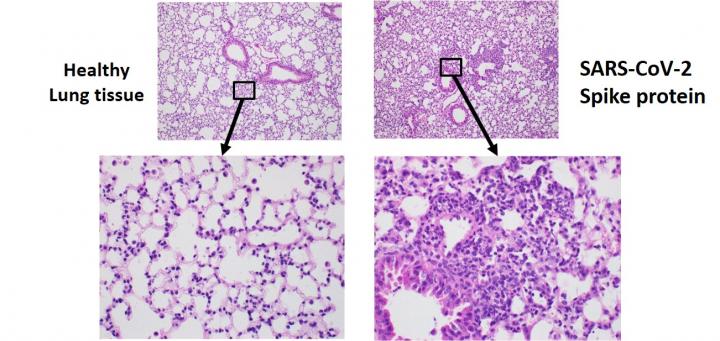New mouse model makes it easier and safer to study COVID-19 lung injury

Credit: Pavel Solopov, Old Dominion University
Using a newly developed mouse model of acute lung injury, researchers found that exposure to the SARS-CoV-2 spike protein alone was enough to induce COVID-19-like symptoms including severe inflammation of the lungs.
SARS-CoV-2, the virus that causes COVID-19, is covered in tiny spike proteins. These proteins bind with receptors on our cells, starting a process that allows the virus to release its genetic material into a healthy cell.
“Our findings show that the SARS-CoV2 spike protein causes lung injury even without the presence of intact virus,” said Pavel Solopov, PhD, DVM, research assistant professor at the Frank Reidy Research Center for Bioelectrics at Old Dominion University. “This previously unknown mechanism could cause symptoms before substantial viral replication occurs.”
Solopov will present the new research at the American Society for Pharmacology and Experimental Therapeutics annual meeting during the virtual Experimental Biology (EB) 2021 meeting, to be held April 27-30.
Studying SARS-CoV-2 can be challenging because experiments involving the intact virus requires a Biosafety Level 3 laboratory. To overcome this hurdle, the researchers created a new model of acute lung injury that utilizes transgenic mice that express the human receptor for SARS-CoV-2 in their lungs.
“Our mouse model dramatically reduces the danger of doing this type of research by allowing COVID-19 lung injury to be studied without using the intact, live virus,” said Solopov. “This will greatly increase and diversify the ability to do COVID-19 research. Our model will also likely be useful for studying other coronaviruses.”
The researchers injected the genetically modified mice with a segment of the spike protein and analyzed their response 72 hours later. Another group of mice received only saline to serve as a control.
The researchers found that the genetically modified mice injected with the spike protein exhibited COVID-19-like symptoms that included severe inflammation, an influx of white blood cells into their lungs and evidence of a cytokine storm – an immune response in which the body starts to attack its own cells and tissues rather than just fighting off the virus. The mice that only received saline remained normal.
“These findings show that the genetically modified mouse together with just a segment of the spike protein can be used to study SARS-CoV-2 lung injury,” said Solopov. “We can use this tool to develop a better understanding of how the spike protein causes lung symptoms — even without the intact virus — in order to develop new targets and therapeutics for COVID-19.”
The researchers plan to continue this line of investigation by using the new mouse model to study the effectiveness of several drugs in reducing the severity of acute lung injury and COVID-19.
Pavel Solopov will present during an on-demand presentation (abstract). Contact the media team for more information or to obtain a free press pass to access the meeting.
Image available.
###
About Experimental Biology 2021
Experimental Biology is an annual meeting comprised of thousands of scientists from five host societies and multiple guest societies. With a mission to share the newest scientific concepts and research findings shaping clinical advances, the meeting offers an unparalleled opportunity for exchange among scientists from across the United States and the world who represent dozens of scientific areas, from laboratory to translational to clinical research.
http://www.
About the American Society for Pharmacology and Experimental Therapeutics (ASPET)
ASPET is a 4,000-member scientific society whose members conduct basic and clinical pharmacological research within the academic, industry and government sectors. Their members discover and develop new medicines and therapeutic agents that fight existing and emerging diseases, as well as increase our knowledge regarding how therapeutics affects humans. http://www.
Find more news briefs and tipsheets at: https:/
Media Contact
Nancy Lamontagne
[email protected]




